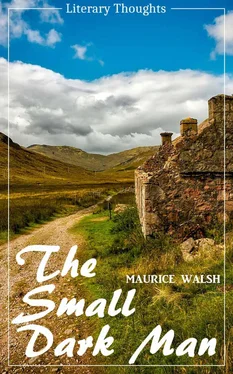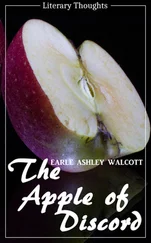“Answer the lady, fellow!” rasped a cold voice above him.
Hugh Forbes, whose eyes had never left the fire, woke up. “Excuse me,” he said, turning to her. “A bad habit I have. What did you want me to tell—your brother?”
Frances Mary Grant had been observing the small man curiously, and now she smiled to him. “That I am here in the bothy at Aunbeg, with a blistered heel, and that he is to send up a pony. You can see we are all right, but that a pony will be necessary, sometime to-night—no hurry.”
And still Hugh Forbes looked at her, and still he did not reply.
“Are you deaf, fool?” barked Vivian Stark exasperatedly.
The small man turned his head up with remarkable suddenness, and the shock of his dark eyes met the shock of the blue ones, solid as a bar. And there was a hard note in his deep-toned voice. “Blast you! Wouldn’t you give me time to think?” He turned and again looked amongst the coals, and Stark, strangely startled by that shock of eye and tongue, took time to think too.
Hugh Forbes told himself that he did not like this tall fellow. Somehow he did not like him one damn bit. He never did care for big blonde men who had no vision but one, who would ignore the gifts of the gods—till they were ready to accept, and be not nice in their manner of acceptance. Autocratic bounders, stupidly unable to get the other fellow’s viewpoint! And, moreover, he did not care for long blonde women who could not hide strong feeling below the deeps of their eyes. But then, this one was Frances Mary who could keep all harm away from a nearly blind and wonderful mother. Tearlath Grant’s sister! Tearlath Grant!—the finest man on top of the world. The most comradely of men! In the press of war, in stress of peace, drunk or sober, a hell of a good man to rely on! A reliable man and yet not a stupid man! A man you could put your finger on and say, “Tearlath may say this, and think thus, and curse hither and yon, but this is what he will do.” The great big quiet boy—and not always that blame quiet either! Yes, and Tearlath had somehow put trust in a small devil of an Irishman from Glounagrianaan, who looked like an Israelite and had the reserve of an irate jackdaw. Therefore he had to do the right thing by Tearlath’s sister—now, this minute. And what in thundering blazes was the right thing to do? Go on down to Innismore and send up a pony? That was the obvious thing, but was it the right thing? Was it, now? Why could not this big lad go? Probably he had been going. If so, Hugh Forbes coming in on them out of the night had made them change their plans. Was he to be the deus ex machina in some small game set by fate? He would see! He would see!
And all this consideration on Hugh Forbes’s part was probably no more than an excuse to hide the fact that, instinctively disliking Vivian Stark, he hated like poison to act deputy for him. His next question seemed to prove that. He looked sideways at Frances Mary, and the half-humorous half-cynical quirk came and went at a mouth corner. “Tell me, now; what were ye going to do?”
Where another might have bridled, she answered frankly and at once. “Vivian—Mr Stark was going.”
And that was that. The obvious thing for Hugh Forbes to do now was to go canny, to be no interloper—to let things go the gait they were going, and all good luck to them. He looked up at Vivian Stark and grinned. “Time you were off, Vivian—Mr Stark.”
“What?” The word snapped. Stark’s temper had been growing warm, and now it grew no cooler.
“The sooner you start the sooner you’ll be back, and a sair bad blister is a sair blister to-night or in the morning.”
There was a silence that seemed to wait, and then came the tall man’s voice, quiet like frost and as cold. “And what do you propose to do?”
“What the devil is that to you?” That voice sounded like tuck of drum.
“I’ll show you,” said Vivian Stark grimly, and his hand came down and gripped. No one can blame him. He had been provoked needlessly, and, worse, his sense of superiority had been outraged. The old burberry bunched under his fingers, but the force of his grip went deep to jacket, shirt, and skin, and Hugh Forbes was jerked to his feet as if he had been a mischievous urchin; jerked and held with a ruthless force not to be resisted. The black velour hat fell off and came to the floor with a soft whuff.
Frances Mary stirred restlessly, and the old chair creaked, but she remained silent. She could not help admiring the force of Vivian Stark, and the face of him. The beauty of that forward-thrown head thrilled her. It was not the face of a hawk now, but the face of a great eagle, the brows in a straight bar, the half-hooded eyes gleaming in the firelight, the strong arch of the nose curving over the line of the mouth. And yet, at the same time, she felt sorry for the little trampish man who had been at once impudent and intriguing. There was some texture in him, thought and speech, that appealed to her, something that she could dimly follow, something sib. And now he looked so helpless in the grip of this young giant. His back was turned to her, the gripped shoulder was lifted to his ear, the other drooped helplessly, his unclenched hands hung limply at his sides, and his feet were ridiculously intoed below slightly bowed knees—altogether like an urchin in the grip of an irate senior, deserving and expecting a lesson. But not to be grievously hurt—surely not to be treated with abasing indignity. That was why she stirred restlessly.
But Vivian Stark, having achieved mastery, had his sense of contemptuous superiority thick upon him. He would do no more than was necessary. He looked at her over the small man’s head and smiled reassuringly, and his voice, when he spoke, had its usual reserved drawl. “It will be all right, Fred. I shall go on to Innismore and take the little tramp along.” He referred to the little tramp as if he were at the end of a mile-long arm.
Frances Mary Grant nodded her fair head. She could not think of anything to say, and Vivian Stark would take his own strong line, anyway. He always did, and his appeal suffered nothing thereby.
Stark, having decided, did not hesitate. “Come on,” he ordered shortly, and gave the small man an admonitory shake, an unmistakable intimation that in all things he must obey.
Hugh Forbes felt that forceful grip painful on his shoulder, but he did not wince. “Shake hard,” he said in a startlingly unperturbed voice. “It will make it all the easier.”
As they reached the door he turned his face over the ungripped shoulder and grinned at Frances Mary. And that grinning face surprised her, because it was not the face of an about-to-be-whipped urchin. It certainly was not the face of an urchin: black brows, wide-winged nose, broad chin, and that queer sardonic quirk at mouth corner—a whole man’s face; and though it grinned at her, there was below the grin some magnetic force of hardihood held in leash.
And then they were gone, and in the oblong of the doorway was nothing but the pale, bluish, wan glimmer of night lit with moon.
No leaf shall fall,
No shadow flow,
But was thus doomed
To fall or flow
Before Time winged its little flight
Or God created Life from Light.
I
The path down the glen, a white line fading along the breast of the brae, started again at the corner of the bothy, and the two men set foot on it and went on marching. Hugh Forbes went first, or was propelled first, for Vivian Stark still grasped his shoulder. The small man seemed to suffer no embarrassment, and his head moved freely as he looked down and across the great valley.
“Thunder o’ God!” he whispered; “what a night, and what a glen!”
The moon had risen above the mountain ramparts of the east, and that side of the glen was black lightening to soft purple. High up against the glow of the sky, right and left, ran the serrated midnight-black silhouette of the great peaks, hushed and stark. Down below in the bottom of the valley the Abhain Ban chuckled subduedly over its shallows, and gleams of silver showed and shimmered and vanished over the white stones. The western slope of the glen, where the moonlight shone, was ghost-like in that pale glow—grey, substanceless, without perspective, scarcely less dark than the star-dusted sky and scarcely less remote. Except for that subdued chuckle of the river there was no sound, no hu-u-sh of air over heather, no cry of bird, no snort of stag—no sound at all. But silence was there, a presence.
Читать дальше












